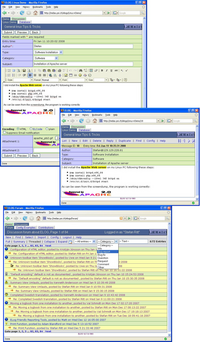Software:ELOG
 Example ELOG web pages | |
| Developer(s) | Stefan Ritt |
|---|---|
| Stable release | 3.1.4-2
/ 2018-09-26 |
| Operating system | Cross-platform |
| Type | Web application |
| License | GPL |
| Website | ELOG home page |
ELOG is a Web application written by Stefan Ritt in C which can be used to create personal and common logbooks. It has been developed at the Paul Scherrer Institute originally for shift logbooks in the particle physics experiment MEG, but is now widely used in other fields. Besides the CERN experiments LHCb and CMS, it is used on the US coastguard icebreaker USCGC Healy and part of the Debian distribution.
ELOG is licensed under the GNU General Public License as free software. It is currently available in 13 languages.
Description
ELOG combines a small internal database with a web front-end in a single program. It can be configured through a single configuration file for different applications such as:
- Personal logbooks. People can write down notes in a chronological order ('entries') and retrieve them with a web browser.
- Shared logbooks. Logbooks can be shared among several people with read and optional write access. The most common use of this are shift logbooks replacing the traditional paper logbook.
- Small databases. ELOG can be configured with arbitrary attributes and thus serve a simple database with search facilities for typically a few thousand entries.
- Discussion forums. The possibility to use threads and automatic email notifications make this software useful for (simple) news group servers.
- Bug tracker. ELOG can be configured to work as a simple Bug tracking system with email notifications and a database for open/fixed bugs.
- Any combination of the above hosted on a single site.
The main difference between ELOG and other systems is the fact that ELOG does not depend on any other package such as a database server or PHP. A single executable together with a configuration file make it very simple to install and use.
Platforms
ELOG consists of a single C program and can be compiled on most systems. Most commonly it is used under Linux, Microsoft Windows, FreeBSD, Mac OS X and Solaris. ELOG is part of the Debian distribution [1].
External links
- ELOG home page at PSI
- "ELOG". http://freecode.com/projects/elog/.
- ELOG page at softpedia.com. Offers older v2.8.1 version, whereas 3.1.4-2 is current version.
- Online demo logbook
